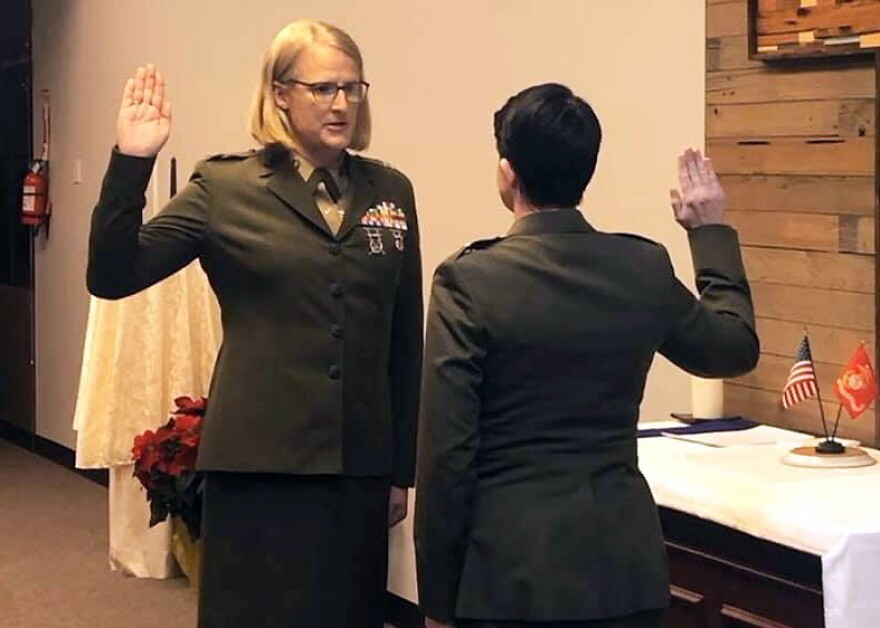The UCLA study shows broad support among servicemembers for transgender people in the military. But the military still bans transgender people from enlisting.
Earlier this year, Emma Shinn moved to a big, hillside house outside of San Diego to work at Camp Pendleton. A Marine judge advocate who transitioned in 2016, Shinn said the move to a new city and new house has been a little stressful.
But she's been comforted by the reaction she's received as she reconnected with Marines who knew her before she transitioned. "They knew me as the old Captain Shinn," she said, sitting at the dining room table in her new house.
Now as she reconnects with her old colleagues, she said they accept her and don't treat her any differently. "Everyone in the unit has welcomed me with open arms," she said.
A recent study from UCLA showed that two-thirds of cisgender active duty military personnel support transgender service members. That number goes up among service members who identify as women or people of color.
Shinn - who also serves as president of SPART*A, a national support group for transgender service members - said the survey results don't surprise her. She recently bumped into a Marine she hadn't seen in years .
"I salute, and he pulls over just a little bit and he rolls down the window, and he says 'Emma,' and he calls me over," she said.
"And it was this really amazing, fantastic experience to have my name and who I am validated."
Shinn joined the service in 1994. In 2004, she was deployed as an infantry platoon sergeant to Iraq. She didn't know any other trans people in her platoon. She hadn't transitioned yet.
"That was something I had buried very deep," she said. "I am 100 percent confident that if I was in that same situation today, I would be a better platoon sergeant than I was in 2004 and 2005. Being able just to be whole, and to be authentic with your troops."
"Whenever you're not bringing your whole self, people can spot that distance," she said.
In 2016, President Obama allowed transgender people to serve openly in the military.
But in 2017, through a series of tweets-turned-policy, President Trump said allowing transgender people to serve would be costly and disruptive.
Now, transgender people can't join the military if they've medically transitioned or been diagnosed with gender dysphoria.
People like Emma Shinn can stay in the military if they had enlisted before the policy change.
The policy seems at odds with the science, said Shannon Dunlap, the UCLA PhD student who cowrote the study showing wide support for transgender servicemembers.
Her study - funded by the Department of Defense - showed strong support across the four branches of the military and across racial lines and sexual orientation.
"This broad support from cisgender, heterosexual, and LGB service members really just speak to the valuable contributions that diversity does bring to the United States military," she said.
The study found servicemembers who identified as gay, as women, or people of color were more likely to accept transgender people in the military.
Black and Latinx service members reported some of the highest support for transgender people - 69 percent and 75 percent, respectively, compared to 64 percent of white people.
82 percent of people of all races identifying as lesbian, gay, or bisexual said they supported transgender servicemembers.
Dunlap attributes this support to the ongoing fights for equality for many marginalized groups.
"They really have historically gone through great lengths to serve honorably in the U.S. military, and they experience the same stressors," she said.
The military historically has been one of the largest employers of transgender people in the country. Many of them are not serving openly.
"It looks like discrimination. It looks like stigma. And it's a real lack of those protections and resources that are afforded to their cisgender counterparts," said.
SPART*A's Emma Shinn said the ban on open transgender service is affecting military recruitment. She said potential soldiers are asking themselves a hard question: is joining worth not transitioning?
"We are losing folks from our recruiting pool in a time where recruiting is challenging," she said.
Shinn says living authentically as herself has made her a better member of the military. Before she transitioned, she lived two lives: a Marine Corps life and a private life.
"And never the twain shall meet," she said. "It's like this nagging pressure, this itch that you just can't scratch, that wears on you. And some days, that itch may be more persistent than others, but it's there until you transition and that itch goes away."
This story was produced by the American Homefront Project, a public media collaboration that reports on American military life and veterans. Funding comes from the Corporation for Public Broadcasting.




